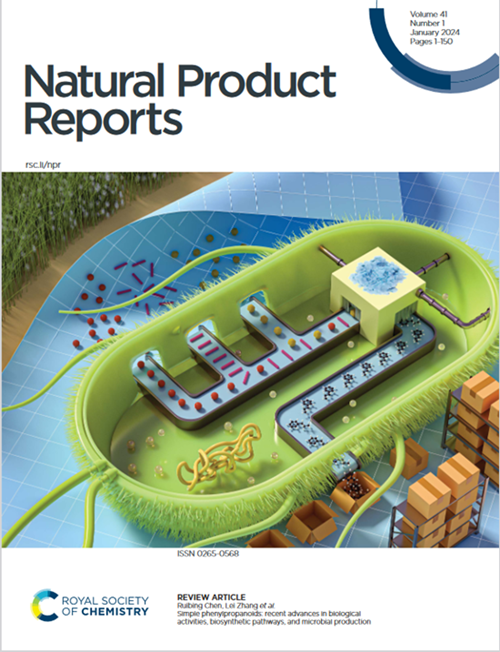去瓶颈化细胞色素 P450 依赖性代谢途径,促进商业天然产品的生物合成。
IF 10.6
1区 化学
Q1 BIOCHEMISTRY & MOLECULAR BIOLOGY
引用次数: 0
摘要
覆盖时间:2016 年至 2024 年底这篇重点文章旨在透视新型生物技术工艺在天然产品 (NPs) 生物制造过程中面临的挑战,这些天然产品的生物合成途径依赖于细胞色素 P450 单氧化酶。该酶超家族是生物合成食品、营养、医药、化工和化妆品行业中使用的大量 NPs 的最广泛的酶超家族之一。这些酶通常表现出极佳的区域和立体选择性,但它们可能存在活性低和不稳定的问题,这严重影响了高性能生物工艺的开发。我们首先简要介绍了工业生物技术,以及在不可持续的化石燃料或植物提取物之外寻找生产 NPs 替代方法的重要性。然后,我们讨论了商业 NP 工艺开发过程中面临的挑战和实施的解决方案,重点关注主要在酵母细胞工厂中依赖 P450 的步骤。我们的重点是强调在利用 P450 依赖性 NP 途径时经常遇到的挑战,以及如何利用蛋白质工程来降低这些途径的瓶颈。最后,我们简要介绍了人工智能和机器学习对指导工程工作的重要性。本文章由计算机程序翻译,如有差异,请以英文原文为准。

Debottlenecking cytochrome P450-dependent metabolic pathways for the biosynthesis of commercial natural products
Covering: 2016 to the end of 2024
This highlight article aims to provide a perspective on the challenges that novel biotechnological processes face in the biomanufacturing of natural products (NPs) whose biosynthesis pathways rely on cytochrome P450 monooxygenases. This enzyme superfamily is one of the most versatile in the biosynthesis of a plethora of NPs finding use across the food, nutrition, medicine, chemical and cosmetics industries. These enzymes often exhibit excellent regio- and stereoselectivity, but they can suffer from low activity and instability, which are serious issues impairing the development of high performing bioprocesses. We start with a brief introduction to industrial biotechnology and the importance of looking for alternative means for producing NPs independently from unsustainable fossil fuels or plant extractions. We then discuss the challenges and implemented solutions during the development of commercial NP processes focusing on the P450-dependent steps primarily in yeast cell factories. Our main focus is to highlight the challenges often encountered when utilizing P450-dependent NP pathways, and how protein engineering can be used for debottlenecking them. Finally, we briefly touch upon the importance of artificial intelligence and machine learning for guiding engineering efforts.
求助全文
通过发布文献求助,成功后即可免费获取论文全文。
去求助
来源期刊

Natural Product Reports
化学-生化与分子生物学
CiteScore
21.20
自引率
3.40%
发文量
127
审稿时长
1.7 months
期刊介绍:
Natural Product Reports (NPR) serves as a pivotal critical review journal propelling advancements in all facets of natural products research, encompassing isolation, structural and stereochemical determination, biosynthesis, biological activity, and synthesis.
With a broad scope, NPR extends its influence into the wider bioinorganic, bioorganic, and chemical biology communities. Covering areas such as enzymology, nucleic acids, genetics, chemical ecology, carbohydrates, primary and secondary metabolism, and analytical techniques, the journal provides insightful articles focusing on key developments shaping the field, rather than offering exhaustive overviews of all results.
NPR encourages authors to infuse their perspectives on developments, trends, and future directions, fostering a dynamic exchange of ideas within the natural products research community.
 求助内容:
求助内容: 应助结果提醒方式:
应助结果提醒方式:


